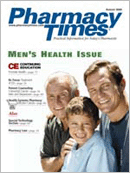Publication
Article
Pharmacy Times
Colorectal Cancer Awareness
Author(s):
The American Cancer Society(ACS) estimates that, in the year2005, ~145,290 people will bediagnosed with colorectal cancer and~56,290 patients will die of the disease.1 Colorectal cancer is the thirdmost commonly diagnosed cancer andthe second most common cause ofcancer death in the United States.1Although many health organizationsrecommend that colorectal cancerscreening begin at the age of 50 forpeople at average risk, <50% of people50 years old or older get tested.1
Colorectal cancer usually developsslowly over a period of many years. Itmay begin as a noncancerous polyp thatdevelops into cancer. More than 95% ofcolorectal cancers are adenocarcinomas,which evolve from glandular tissue.1
Risk Factors
Ninety percent of cases of colorectalcancer occur in patients over age 50,and ~75% of these cases occur inpatients with no known medical riskfactors for developing the disease.2Examples of some of these risk factors1,2are as follows:
- Age—risk increases after age 50
- Gender—incidence is >35% higherin men than in women1
- Ethnicity—incidence and mortalityare highest among AfricanAmericans1
- Family history of colorectal cancer
- History of bowel disorders, such aschronic inflammatory bowel disease,or history of adenomatouspolyps
Signs and Symptoms
In many cases, there are no signs orsymptoms during the early stages ofthis cancer. When present, they mayinclude the following:
- Changes in bowel habits, such asworsening constipation or recurringdiarrhea
- Blood in the stool (either brightred or very dark)
- Stools that are narrower than usual
- Frequent abdominal pain (gaspains, cramps, or bloating)
- General feeling of malaise
- Unexplained weight loss
- Vomiting
Patients should be encouraged toconsult a physician to discuss any ofthese symptoms.
Detection
Colorectal cancer can be highly curableif detected in the early stages.Individuals 50 years old or oldershould be screened regularly. Thosewith known risk factors should beginextensive testing and screening evenearlier. The ACS recommends thatpatients over age 50 have a fecal occultblood test annually and a sigmoidoscopyevery 5 years.2
Screening tests available include thefollowing2:
- Fecal occult blood test—This testchecks for hidden blood in thestool. Two OTC tests areColoCARE and EZ Detect stoolblood tests. Studies have shownthat, when this type of test is doneevery 1 to 2 years, the number ofdeaths due to colorectal cancer isreduced by as much as 30%.3
- Sigmoidoscopy—This examinationexplores the rectum and lowerthird of the colon for precancerousand cancerous growths
- Double contrast barium enema—In this test, the contrast materialused expands the colon and allowsa radiologist to see whether largepolyps are present
- Colonoscopy—This test examinesthe rectum and the entire colon. Itcan find both precancerous andcancerous growths.
Treatment Options
Individuals diagnosed with colorectalcancer may receive surgery, chemotherapyor radiation, or a combinationof these therapies. The type of treatmentis dependent upon the stage ofthe cancer, whether the cancer is arecurrence, and/or the individual'sgeneral health status.
Examples of Some NewPharmacologic Therapies
Oxaliplatin (Eloxatin, Sanofi-Aventis) was first approved by the FDAin 2002 for the treatment of advancedcolorectal cancer, and it is nowapproved as first-line treatment whencombined with 5-fluorouracil (FU) andleucovorin (LV).4 Oxaliplatin, used incombination with infusional 5-FU/LV,is indicated for adjuvant treatment ofstage III colon cancer patients whohave undergone complete resection ofthe primary tumor. The indication isbased on an improvement in diseasefreesurvival, but with no demonstratedbenefit in overall survival after amedian follow-up of 4 years.5
In 2004, the FDA approved 2 newpharmacologic treatments for advancedcolorectal cancer. These agents,bevacizumab (Avastin, Genentech)and cetuximab (Erbitux, ImCloneSystems Inc and Bristol-Myers Squibb)are part of the drug class known asmonoclonal antibodies. Bevacizumabis indicated for use in combinationwith intravenous 5-FU-based chemotherapyas first-line treatment ofpatients with metastatic carcinoma ofthe colon or rectum.6 Cetuximab isindicated for use in combination withirinotecan for the treatment of epidermalgrowth factor receptor-expressing,metastatic colorectal carcinoma inpatients who are refractory to irinotecan-based chemotherapy.7 Cetuximabis the first monoclonal antibody approvedto treat this type of cancer.8
Preventing Colorectal Cancer
Although the exact cause of colorectalcancer still is not known, there aremany measures that can be taken toprevent it. The most powerful tool isroutine screening, because this cancercan be diagnosed in the early stages,thus increasing the chance for survival.Other measures that can aid in preventingor decreasing the risk of developingthis cancer include the following:
- A diet rich in fruits, vegetables,and whole grains and a limitedintake of high-fat foods
- Exercise—moderate levels of activity,at least 30 minutes a day, for 5or more days a week
Studies in the prevention of colorectalcancer suggest that risks can be loweredby the following factors3,9:
- Intake of vitamins and calcium—studies suggest that taking a dailymultivitamin with folic acid canlower one's risk. Calcium and vitaminD also can help.
- Use of nonsteroidal anti-inflammatorydrugs
- Hormone replacement therapy inpostmenopausal women
- Use of statins—studies have shownthat these drugs inhibit the growthof colon cancer cells grown in thelaboratory9
Conclusion
Although there are many treatmentsfor colorectal cancer, the most effectivestrategies are early detection and preventivemeasures to lessen the possibilityof developing the disease. Pharmacistsshould remind and encouragepatients to get screened regularly and toconsult their physicians when needed.For more information, one should visitthe American Cancer Society Web site atwww.cancer.org or the National CancerInstitute Web site at www.cancer.gov.
Ms. Terrie is a clinical pharmacy writerbased in the northern Virginia area.
For a list of references,send a stamped, self-addressed envelope to:References Department, Attn. A. Stahl,Pharmacy Times, 241 Forsgate Drive,Jamesburg, NJ 08831; or send an e-mailrequest to: [email protected].

Newsletter
Stay informed on drug updates, treatment guidelines, and pharmacy practice trends—subscribe to Pharmacy Times for weekly clinical insights.






